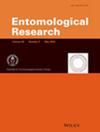Artificial Diets as Viable Substitutes for Host Plants in the Growth of Locusta migratoria
Abstract
This study examined the growth and developmental responses of Locusta migratoria nymphs to different artificial diet formulations and explored efficient feeding strategies to optimize their performance. The diet formulated with wheat bran and fish meal (WF) was more suitable for L. migratoria than the other diets, supporting improved growth and survival. Contrastingly, casein- and sucrose-containing diets (WCS) demonstrated higher cannibalism rates and lower survival. Further fish meal ratio optimization in WF diets demonstrated that wheat bran + fish meal 8% (WF8) provided the most suitable growth and survival balance. WF8 exhibited slightly lower feed efficiency and weight gain than the natural host plants, wheat and corn; however, the developmental period was comparable. This indicated WF8's potential as a promising alternative diet. Particularly, transitioning to artificial diets from the fourth instar after feeding natural host plants until the third instar led to substantially higher survival rates and adult body weight than continuous feeding on a single diet. These results establish WF8 as a promising artificial diet for L. migratoria and provide valuable insights into sustainable and efficient feeding strategies for large-scale insect farming. This study supports the development of sustainable insect production systems and promotes the advancement of the edible insect industry as an alternative protein source.

 求助内容:
求助内容: 应助结果提醒方式:
应助结果提醒方式:


